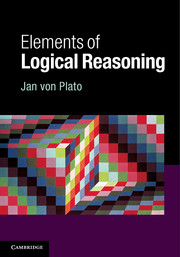Book contents
- Frontmatter
- Contents
- Preface
- PART I First steps in logical reasoning
- 1 Starting points
- 2 Rules of proof
- 3 Natural deduction
- 4 Proof search
- 5 Classical natural deduction
- 6 Proof search in classical logic
- 7 The semantics of propositional logic
- Part II Logical reasoning with the quantifiers
- Part III Beyond pure logic
- Part IV Complementary topics
- Suggestions for the use of this book
- Further reading
- Bibliography
- Index of names
- Index of subjects
7 - The semantics of propositional logic
Published online by Cambridge University Press: 05 June 2014
- Frontmatter
- Contents
- Preface
- PART I First steps in logical reasoning
- 1 Starting points
- 2 Rules of proof
- 3 Natural deduction
- 4 Proof search
- 5 Classical natural deduction
- 6 Proof search in classical logic
- 7 The semantics of propositional logic
- Part II Logical reasoning with the quantifiers
- Part III Beyond pure logic
- Part IV Complementary topics
- Suggestions for the use of this book
- Further reading
- Bibliography
- Index of names
- Index of subjects
Summary
The explanation of the notion of a proposition in Section 1.3 required that such propositions be complete declarative sentences that state a possible state of affairs. The notion of logical truth tries to capture the relation between such sentences and states of affairs, and to be formulated relative to classical and intuitionistic ways of reasoning, respectively. We start with the former because it is simpler, then explain the Kripke semantics of intuitionistic propositional logic. In the final section, a completeness proof is given for classical propositional logic that ties closely together the proof system of Chapter 6 and the standard ‘truth-table’ semantics of this chapter.
Logical truth
The semantics of classical propositional logic is based on a notion of absolute truth, whatever that may be. Specifically, each atomic proposition will be either true or false. The concept of truth in classical propositional logic is built on such an assumption:
Basic assumption about truth. The truth and falsity of atomic propositions in specific circumstances is determined in itself.
How this determination takes place, whether truth and falsity can be actually determined and known, etc., are questions from which this notion of truth abstracts away: The different possible states of affairs are represented abstractly so that to each of any given atomic formulas P1,…, Pn is assigned a truth value, either the value true that is abbreviated as t or the value false that is abbreviated as f.
Information
- Type
- Chapter
- Information
- Elements of Logical Reasoning , pp. 96 - 112Publisher: Cambridge University PressPrint publication year: 2014
